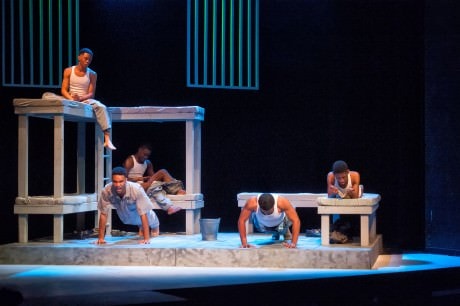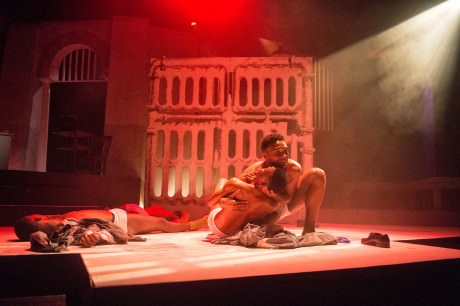Although it was written in 1938, six years before his breakthrough hit The Glass Menagerie, Tennessee Williams’ Not About Nightingales was only produced in 1998, due to the persistence of actor Vanessa Redgrave’s investigations. In its current DC production at Howard University, Director Eric Ruffin breaths life into this long-forgotten gem of a play, crafting a production that is intense, poetic, and deeply satisfying.

The action takes place in an unnamed American prison, run by the narcissistic and inhuman warden, Boss Whelan (Ryan Swain). In this production, the Warden wears an oversized papier-mâché head and hands, creating a human/puppet caricature that is by turns comic and terrifying. The head and hands, exquisitely constructed by Patti Kalil (who is also co-Artistic Director of DC’s own Puppet Theatre Company, Pointless) set the Warden apart from the rest of the cast in a clear and visually arresting manner. In the text, Boss Whelan already appears rather non-human, cruel to the point of sadism and with a dangerously lecherous streak. Thus, Mr. Ruffin’s choice to make the character into a literal caricature is quite fitting. Likewise, Ryan Swain gives a tremendously erudite performance, moving his limbs in a quasi-kabuki shuffle that gives Boss Whelin a decidedly goblin-like mystique.
The prisoners themselves are a hodge podge of increasingly desperate and brutalized men, led by a Stanley Kowalski-esque strongman named Butch (Kamau Mitchell). Inspired (or intimidated) by Butch into starting a hunger strike, the prisoners slowly gather media attention to their cause. Under increasing pressure from the press, and from his own chaplain (played with a thunderous righteousness by Dr. Greg Carr, who also chairs the Afro-American Studies Department at Howard), Boss Whelan decides to strike back against his mutinous captives, and hard.
Meanwhile, “Canary Jim” (Neko Ramos), a prisoner so named because of his perceived closeness to the Warden, is torn over his moral responsibility to his fellow inmates versus his own desire to be paroled in a month. Complicating matters is the new stenographer, Eva (Olivia Russell), who promptly falls in love with the tortured Jim and urges him to flee with her to a better life. The anguished relationship between Eva and Jim, played with great honesty and sensitivity by Mr. Ramos and Ms. Russell, acts as a microcosm of all the prisoners’ shattered dreams and broken dignity.
It is the consistently high quality of the performances that elevate the show from a righteous paean for social justice into an intriguing examination of the human spirit. The aforementioned Ryan Swain, as the papier-mâché clad Warden, is a true villain that, inexplicably, remains likable despite his abuses. Kamau Mitchell, as the bullying leader Butch, struggles a bit to find his footing before landing on a character that is intense and vulnerable. Douglas Ruffin plays the un-subtly named Queen, a manicure-obsessed diva who is stronger than he first appears. Alexia Maree is Goldie, Butch’s once-girlfriend who appears to him periodically in dreamlike sequences that are poignant and revealing.
There are several strong directorial choices that add texture to the show. Chief among them is the papier-mâché Warden, but there are others: stepping in the aisles (by Choreographer Jakari Sherman) to signify the unity of the hunger strike, and some spoken word sequences to boot. Not all of the choreographed moments work, but the ones that do add great value to the show. The sound design, by Cresent Haynes, is an omniscient, foreboding force, ambitious in scope, if executed somewhat distractedly. Nevertheless, the constant boom of the sound, together with ample haze and the oppressive heat of the Ira Aldridge Theatre, created an atmosphere that was rather well, prison-like.

Tennessee Williams was inspired to write Not About Nightingales by a newspaper report he read about inmates dying under medieval conditions in a Pennsylvania institution. The resulting play is brutal, and not just because of the inhumane tortures happening on stage; disturbing, too, is the fact that so many of the complaints voiced by Williams in 1938 are still unanswered today. But although Not About Nightingales isn’t exactly light entertainment, it is thought-provoking, emotionally affecting, and ultimately deeply satisfying.
Running Time: Two and a half hours, with one fifteen minute intermission.
Not About Nightingales plays through this Sunday, November 9, 2014 at Howard University, performing at the Ira Aldridge Theater – 2455 6th Street NW, in Washington, D.C. Tickets can be purchased at the door, by calling the box office at (202) 806-7700, or by going online.





